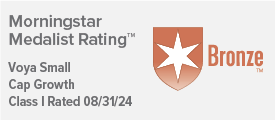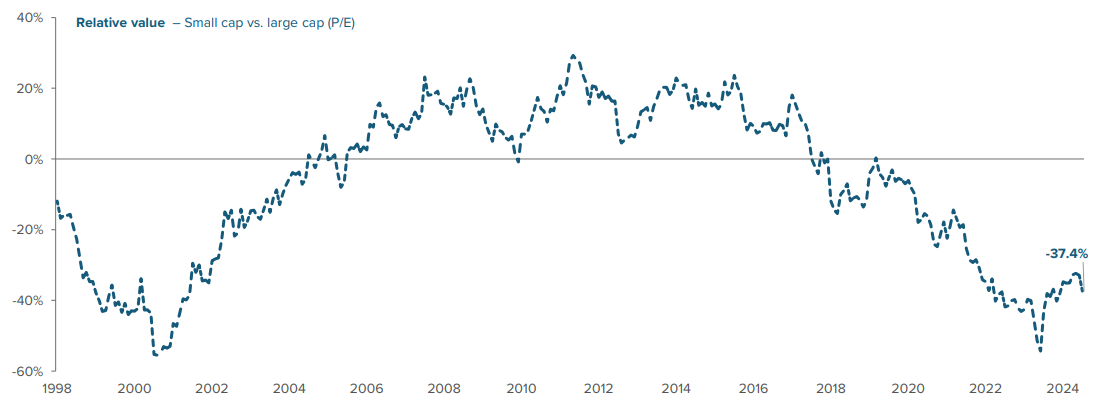

Following sharp compression in earnings multiples year to date, U.S. small cap growth stocks are at their cheapest levels relative to large cap growth stocks since January 2001. Is now the time to reassess exposure to large cap growth in favor of small cap growth? We see reasons to consider U.S. small cap growth right now.

As of 06/30/24. Source: FTSE Russell, Voya Investment Management. P/E: Trailing 12-month price/earnings ratio, based on the Russell 2000 Growth Index (small cap) and Russell 1000 Growth Index (large cap). Past performance does not guarantee future results. Investors cannot directly invest in an index.
Product Facts
| Ticker Symbol | TCMSX |
| CUSIP | 92913L288 |
| Inception Date | October 1, 2004 |
| Dividends Paid | Annually |
| Min. Initial Investment | $250,000.00 |
About this Product
- Invests primarily in stocks of smaller, lesser-known U.S. companies which fall within the range of the Russell 2000 Growth Index
- Seeks companies with superior revenue and earnings potential that are trading at sustainable valuations
- Consistently applied philosophy and process across various market cycles driven by bottom-up fundamental analysis
- Diversified, high quality, risk adjusted portfolio seeking to outperform the Russell 2000 Growth Index
Investment Objective
The Fund seeks capital appreciation.
Performance
Average Annual Total Returns %
As of May 31, 2025
As of March 31, 2025
| Most Recent Month End | YTD | 1 YR | 3 YR | 5 YR | 10 YR | Expense Ratios | |
|---|---|---|---|---|---|---|---|
| Gross | Net | ||||||
| Net Asset Value | -9.96 | -3.74 | +7.73 | +9.72 | +9.51 | 0.93% | 0.93% |
| With Sales Charge | -9.96 | -3.74 | +7.73 | +9.72 | +9.51 | ||
| Net Asset Value | -11.18 | -4.27 | +2.40 | +14.65 | +9.40 | 0.93% | 0.93% |
| With Sales Charge | -11.18 | -4.27 | +2.40 | +14.65 | +9.40 | ||
| Russell 2000 Growth Index | -6.01 | +3.45 | +7.94 | +7.00 | +6.67 | — | — |
| Russell 2000 Growth Index | -11.12 | -4.86 | +0.78 | +10.78 | +6.14 | — | — |
Inception Date - Class I: October 1, 2004
Current Maximum Sales Charge: 0.00%
The performance quoted represents past performance and does not guarantee future results. Current performance may be lower or higher than the performance information shown. The investment return and principal value of an investment in the Portfolio will fluctuate, so that your shares, when redeemed, may be worth more or less than their original cost. See above "Average Annual Total Returns %" for performance information current to the most recent month-end.
Returns for the other share classes will vary due to different charges and expenses. Performance assumes reinvestment of distributions and does not account for taxes.
Total investment return at net asset value has been calculated assuming a purchase at net asset value at the beginning of the period and a sale at net asset value at the end of the period; and assumes reinvestment of dividends, capital gain distributions and return of capital distributions/allocations, if any, in accordance with the provisions of the dividend reinvestment plan. Net asset value equals total Fund assets net of Fund expenses such as operating costs and management fees. Total investment return at net asset value is not annualized for periods less than one year.
The Russell 2000 Growth Index is an unmanaged index that measures the performance of smaller U.S. companies with greater-than-average growth orientation. It is a small-cap stock market index that makes up the smallest 2,000 stocks in the Russell 3000 Index.
Past performance does not guarantee future results.
Returns-Based Characteristics
As of May 31, 2025
| 3 Year | 5 Year | 10 Year | |
|---|---|---|---|
| Alpha Alpha: A measure of risk-adjusted performance; alpha reflects the difference between a portfolio's actual return and the return that could be expected give its risk as measured by beta. | -0.05 | 2.86 | 2.98 |
| Beta Beta: The sensitivity of a portfolio's returns to changes in the return of the market as measured by the index or benchmark that represents the market. A portfolio with a beta of 1.0 behaves exactly like the index. A beta less than 1.0 suggests lower risk than the index, while a beta greater than 1.0 indicates a risk level higher than the index. | 0.93 | 0.89 | 0.91 |
| Information Ratio Information Ratio: The ratio of portfolio returns in excess of a market index to the variability of those excess returns; in effect, information ratio describes the value added by active management in relation to the risk taken to achieve those returns. | -0.05 | 0.47 | 0.53 |
| R2 R2: The proportion of the variation in a portfolio's returns that can be explained by the variability of the returns of an index. High R-squared (close to 1.0) is usually consistent with broad diversification. | 0.96 | 0.93 | 0.94 |
| Sharpe Ratio Sharpe Ratio: A risk-adjusted measure calculated using standard deviation and excess return to determine reward per unit of risk. The higher the Sharpe ratio, the better the portfolio's historical risk-adjusted performance. | 0.13 | 0.33 | 0.37 |
| Standard Deviation Standard Deviation: A measure of the degree to which an individual probability value varies from the distribution mean. The higher the number, the greater the risk. | 21.65 | 20.62 | 20.08 |
Growth of a $10,000 Investment
For the period 06/30/2015 through 05/31/2025
Ending Value: $24,796.00
The performance quoted in the "Growth of a $10,000 Investment" chart represents past performance. Performance shown is without sales charges; had sales charges been deducted, performance would have been less. Ending value includes reinvestment of distributions.
Portfolio
Portfolio Statistics
As of May 31, 2025
| Number of Holdings Number of Holdings: Number of Holdings in the investment. | 95 |
| P/E next 12 months P/E: P/E (next 12 months) calculates the price of a stock divided by its earnings per share. | 25.68 |
| P/B trailing 12 months P/B: Price to book ratio (trailing 12 month) calculates the ratio of a stock’s price to its book value. | 4.69 |
| Weighted Average Market Cap millions Weighted Average Market Cap: Weighted Average Market Capitalization is the value of a corporation as determined by the market price of its issued and outstanding common stock. | $5,885.0 |
| EPS Growth (3-5 Year Estimate) EPS Growth (3-5 Year Estimate): The portion of a company's profit allocated to each outstanding share of common stock. EPS growth serves as an indicator of a company's profitability. | 14.66 |
| Active Share Active Share: Active Share is a measure of the percentage of stock holdings in a manager's portfolio that differ from the benchmark index. | 79.08 |
| Price to Cash Flow Price to Cash Flow: The ratio of a stock’s price to its cash flow per share. The price-to-cash flow ratio is an indicator of a stock’s valuation | 28.18 |
| ROA % ROA: ROA is an indicator of how profitable a company is relative to its total assets. ROA gives an idea as to how efficient management is at using its assets to generate earnings. | 2.13 |
| Total |
Top Holdings
% of Total Investments as of May 31, 2025
| Western Alliance Bancorp | 2.16 |
| Rambus Inc. | 2.13 |
| Tower Semiconductor Ltd | 2.04 |
| Ensign Group, Inc. | 2.01 |
| Carpenter Technology Corporation | 1.91 |
| Kirby Corporation | 1.89 |
| Granite Construction Incorporated | 1.85 |
| Lumentum Holdings, Inc. | 1.83 |
| ACI Worldwide, Inc. | 1.80 |
| Clean Harbors, Inc. | 1.70 |
| Total | #,###.2 |
Portfolio Composition
as of May 31, 2025
| EM Equity | 2.94 |
| Foreign Stocks | 5.53 |
| Cash | 3.39 |
| US Common Stocks | 88.14 |
| Total | #,###.2 |
Top Sectors
% of Total Investments as of May 31, 2025
| INDUSTRIALS | 26.46 |
| INFORMATION TECHNOLOGY | 22.34 |
| HEALTH CARE | 21.83 |
| CONSUMER DISCRETIONARY | 9.29 |
| FINANCIALS | 8.88 |
| MATERIALS | 3.72 |
| CONSUMER STAPLES | 3.53 |
| ENERGY | 2.89 |
| REAL ESTATE | 1.06 |
| COMMUNICATION SERVICES | 0.00 |
| UTILITIES | 0.00 |
| Total | #,###.2 |
Top Country Weightings
% of Total Investments as of May 31, 2025
| United States | 91.23 |
| Israel | 3.30 |
| Cayman Islands | 1.56 |
| India | 1.48 |
| United Kingdom | 1.37 |
| Canada | 1.06 |
| Total | #,###.2 |
Information provided is not a recommendation to buy or sell any security. Portfolio data is subject to daily change.
Investment Team
Disclosures
Principal Risks
All investing involves risks of fluctuating prices and the uncertainties of rates of return and yield inherent in investing. You could lose money on your investment and any of the following risks, among others, could affect investment performance. The following principal risks are presented in alphabetical order which does not imply order of importance or likelihood: Company; Currency; Environmental, Social, and Governance (Equity); Focused Investing; Foreign (Non-U.S.) Investments/ Developing and Emerging Markets; Growth Investing; Health Care Sector (Focused Investing); Investment Model; Liquidity; Market; Market Disruption and Geopolitical; Other Investment Companies; Securities Lending; Small-Capitalization Company; Technology Sector (Focused Investing). Investors should consult the Fund’s Prospectus and Statement of Additional Information for a more detailed discussion of the Fund’s risks.
The fund discussed may be available to you as part of your employer sponsored retirement plan. There may be additional plan level fees resulting in personal performance that varies from stated performance. Please call your benefits office for more information.



